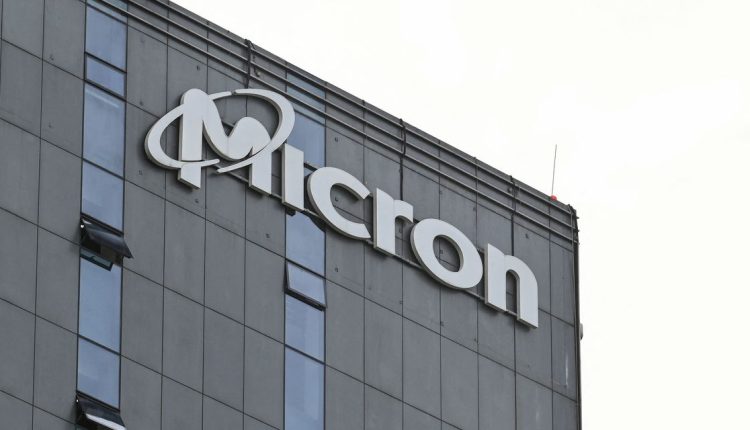Micron Technology Inc. is far from out of the woods yet when it comes to profitability as quarterly results came in better than expected Wednesday, but the memory-chip maker’s chief executive was upbeat about data-center sales in 2024 as AI fever rages on.
While the Boise, Idaho-based chip maker topped expectations for its fiscal fourth quarter, it forecast a loss of $1.14 to $1 a share on revenue of $4.2 billion to $4.6 billion for the fiscal first quarter. Analysts surveyed by FactSet, however, had forecast, on average, a loss of 88 cents a share on revenue of $4.24 billion.
Micron also expects negative gross margins for a fourth consecutive quarter in the fiscal first quarter, between a 6% and 2% loss, which Micron Chief Financial Officer Mark Murphy said on the call assumed no additional inventory write-down because of memory-chip pricing.
Following gross margins of 22.9% reported in the first quarter of fiscal 2023, gross margins swung sharply to negative-31.4% as Micron reported its largest quarterly loss on record in March, writing off more than $1.4 billion in inventory. Those margins improved to negative-16.1% in the third quarter. On Wednesday, those continued to improve sequentially, to negative-9.1% in the fourth quarter.
Additionally, the company said it is still experiencing headwinds from China’s cybersecurity review of the company’s products, which surfaced in March.
Micron
MU,
shares declined nearly 4% after hours Wednesday following a 0.4% rise to close the regular session at $68.21.
On a conference call, Micron Chief Executive Sanjay Mehrotra told analysts he expects revenue from high-bandwidth memory chips designed for data centers “to begin in early 2024,” and that the company is “very much still on track for meaningful revenue, several hundred million dollars in our fiscal year 2024.”
Back in July, Micron and Nvidia Corp.
NVDA,
announced that Nvidia was using Micron’s HBM3 Gen2 high-bandwidth memory 1-beta DRAM chips in its AI data-center products. As the AI frenzy has raged on all year, data centers that must handle the enormous amounts of data and throughput required by AI models like Open AI’s ChatGPT, backed by Microsoft Corp.
MSFT,
have boosted demand for hardware.
Micron specializes in making DRAM and NAND memory chips. DRAM, or dynamic random access memory, is the type of memory commonly used in PCs and data-center servers, while NAND chips are the flash memory chips used in smaller devices like smartphones and USB drives.
Read: Micron’s stock might be an excellent play for AI investors who want to diversify beyond Nvidia
In the company’s last earnings report, Mehrotra called the bottom in the memory-chip market, but warned that smartphone and PC weakness could cut into AI gains. This time around, the CEO said smartphone and PC markets were “now at normal levels.”
Read: AI will accelerate Micron’s recovery, analyst says
For the fiscal fourth quarter, Micron reported a loss of $1.43 billion, or $1.31 a share, versus net income of $1.49 billion, or $1.35 a share, in the year-ago period.
The adjusted loss, which excludes stock-based-compensation expenses and other items, was $1.07 a share, versus adjusted earnings of $1.45 a share in the year-ago period. Revenue fell to $4.01 billion from $6.64 billion in the year-ago quarter.
Analysts had forecast Micron to report a fourth-quarter loss of $1.15 a share on revenue of $3.95 billion.
Micron shares are up 36.5% year to date, compared with a 32.8% gain by the PHLX Semiconductor Index
SOX,
an 11.3% gain by the S&P 500 index
SPX
and a 25.1% rise in the Nasdaq Composite
COMP.
Read the full article here

